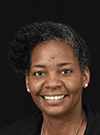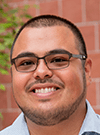ASHG in partnership with NHGRI, Biogen, and Roche are pleased to recognize this year’s Scholars. The Human Genetics Scholars Initiative was developed to help advance diversity and inclusion in the human genetics research workforce.
 Jacqueline Harris, PhD is currently an Assistant Professor of Chemistry at Grambling State University and has multidisciplinary training in biostatistics and biochemistry. Her academic background includes post-doctoral training in statistical genetics at The University of Alabama at Birmingham (UAB) in the Department of Biostatistics Section on Statistical Genetics. She received her PhD in Chemistry from the University of Mississippi. Dr. Harris has received formal and practical training in statistics and statistical genetics. She has published in the following areas: statistical modeling of health disparities, and genetic network discovery in the Hap Map data set. Dr. Harris’ research aims to contribute to the understanding of underlying genetic and environmental factors that contribute to metabolic disease and health disparities.
Jacqueline Harris, PhD is currently an Assistant Professor of Chemistry at Grambling State University and has multidisciplinary training in biostatistics and biochemistry. Her academic background includes post-doctoral training in statistical genetics at The University of Alabama at Birmingham (UAB) in the Department of Biostatistics Section on Statistical Genetics. She received her PhD in Chemistry from the University of Mississippi. Dr. Harris has received formal and practical training in statistics and statistical genetics. She has published in the following areas: statistical modeling of health disparities, and genetic network discovery in the Hap Map data set. Dr. Harris’ research aims to contribute to the understanding of underlying genetic and environmental factors that contribute to metabolic disease and health disparities.
 Jordan Hughey is a Bioinformatics and Genomics PhD Candidate under Dr. Dajiang Liu at Penn State. His thesis work focuses on developing computational approaches that integrate multi-omic data to elucidate mechanisms behind complex traits. Furthermore, Jordan performed experimental research developing and testing DNA sequencing technologies during his undergraduate at the University of California, Santa Cruz. As a graduate fellow, he has been awarded the National Science Foundation Graduate Research Fellowship and Alfred P. Sloan Foundation Minority PhD Scholarship. Being a member of many STEM diversity groups, Jordan is a passionate advocate for increasing diversity and inclusion in STEM higher education.
Jordan Hughey is a Bioinformatics and Genomics PhD Candidate under Dr. Dajiang Liu at Penn State. His thesis work focuses on developing computational approaches that integrate multi-omic data to elucidate mechanisms behind complex traits. Furthermore, Jordan performed experimental research developing and testing DNA sequencing technologies during his undergraduate at the University of California, Santa Cruz. As a graduate fellow, he has been awarded the National Science Foundation Graduate Research Fellowship and Alfred P. Sloan Foundation Minority PhD Scholarship. Being a member of many STEM diversity groups, Jordan is a passionate advocate for increasing diversity and inclusion in STEM higher education.
 Deyana Lewis, PhD is a postdoctoral fellow at the National Human Genome Research Institute. She obtained a PhD from the University of Pittsburgh Graduate School of Public Health where her dissertation focused on health disparities in dental genetics. Dr. Lewis performs research in the field of genetic epidemiology/statistical genetics. She is currently leading analyses of whole exome and genome sequencing of African American men with hereditary prostate cancer from the African American Hereditary Prostate Cancer (AAHPC) study with the aim to identify causal genes and high-risk variants. She is also an advocate for mentoring underrepresented minority students in STEM.
Deyana Lewis, PhD is a postdoctoral fellow at the National Human Genome Research Institute. She obtained a PhD from the University of Pittsburgh Graduate School of Public Health where her dissertation focused on health disparities in dental genetics. Dr. Lewis performs research in the field of genetic epidemiology/statistical genetics. She is currently leading analyses of whole exome and genome sequencing of African American men with hereditary prostate cancer from the African American Hereditary Prostate Cancer (AAHPC) study with the aim to identify causal genes and high-risk variants. She is also an advocate for mentoring underrepresented minority students in STEM.
 Trenell Mosley is a Doctoral Candidate at Emory University. She obtained her Bachelor’s in Science in Human Biology from The University of Texas at Austin. She currently works under Dr. Michael Zwick and Dr. Jennifer Mulle, and her thesis work is aimed at understanding the contributions of genetic and genomic variation to rare genetic disorders. Specifically, she focuses on the influence of genomic architecture in the formation of recurrent copy number variants. She also works extensively within the university to aid and advocate for diversity support and inclusion on campus and, more broadly, in STEM higher education and the workforce.
Trenell Mosley is a Doctoral Candidate at Emory University. She obtained her Bachelor’s in Science in Human Biology from The University of Texas at Austin. She currently works under Dr. Michael Zwick and Dr. Jennifer Mulle, and her thesis work is aimed at understanding the contributions of genetic and genomic variation to rare genetic disorders. Specifically, she focuses on the influence of genomic architecture in the formation of recurrent copy number variants. She also works extensively within the university to aid and advocate for diversity support and inclusion on campus and, more broadly, in STEM higher education and the workforce.
 Tess Pottinger, PhD is a Postdoctoral Research Scientist at the Institute for Genomic Medicine at Columbia University where she performs research in the field of statistical genetics. Her current project includes optimizing rare variant analysis techniques through machine learning across various disease phenotypes using whole exome and whole genome data. She obtained a Ph.D. in Biomedical Informatics with a focus in Human Genetics from Northwestern University where she performed research in uncovering rare and common variation underlying heart failure using longitudinal phenotyping in a medical biobank.
Tess Pottinger, PhD is a Postdoctoral Research Scientist at the Institute for Genomic Medicine at Columbia University where she performs research in the field of statistical genetics. Her current project includes optimizing rare variant analysis techniques through machine learning across various disease phenotypes using whole exome and whole genome data. She obtained a Ph.D. in Biomedical Informatics with a focus in Human Genetics from Northwestern University where she performed research in uncovering rare and common variation underlying heart failure using longitudinal phenotyping in a medical biobank.
 Oscar Rodriguez is a PhD student at the Icahn School of Medicine at Mount Sinai in the Department of Genetics and Genomic Sciences under the supervision of Dr. Andrew Sharp and Dr. Ali Bashir. His research focuses on resolving complex regions of the human genome and structural variants with a particular focus on tandem repeats and the immunoglobulin heavy chain locus. He received his B.Sc. in Biomedical Science with a focus on Bioinformatics from the NYU Tandon School of Engineering.
Oscar Rodriguez is a PhD student at the Icahn School of Medicine at Mount Sinai in the Department of Genetics and Genomic Sciences under the supervision of Dr. Andrew Sharp and Dr. Ali Bashir. His research focuses on resolving complex regions of the human genome and structural variants with a particular focus on tandem repeats and the immunoglobulin heavy chain locus. He received his B.Sc. in Biomedical Science with a focus on Bioinformatics from the NYU Tandon School of Engineering.
 Loren Saulsberry, PhD is an Assistant Professor in Health Policy and Health Services Research in the Department of Public Health Sciences at The University of Chicago. Her research program aims to evaluate and guide the implementation of pharmacogenomics (PGx) into clinical practice in a manner that advances health equity within genomic medicine. She has studied the diffusion and uptake of emerging medical technologies to treat chronic diseases with a particular focus on how health innovations impact health disparities. Dr. Saulsberry received her Ph.D. in Health Policy from Harvard University and is an alumna of the Dana Farber/Harvard Cancer Center’s Training in Oncology Population Sciences Program. Before entering academia, her prior experiences include cancer genetics research and working with the Kaiser Family Foundation.
Loren Saulsberry, PhD is an Assistant Professor in Health Policy and Health Services Research in the Department of Public Health Sciences at The University of Chicago. Her research program aims to evaluate and guide the implementation of pharmacogenomics (PGx) into clinical practice in a manner that advances health equity within genomic medicine. She has studied the diffusion and uptake of emerging medical technologies to treat chronic diseases with a particular focus on how health innovations impact health disparities. Dr. Saulsberry received her Ph.D. in Health Policy from Harvard University and is an alumna of the Dana Farber/Harvard Cancer Center’s Training in Oncology Population Sciences Program. Before entering academia, her prior experiences include cancer genetics research and working with the Kaiser Family Foundation.
 Mario Trejo is completing a PhD in Epidemiology at the University of Arizona. His dissertation involves analyzing clinical trial genomic data to examine the association between genetic variation and colorectal adenoma recurrence. During his MPH program, Mario was a CEESP fellow in Zambia where he studied HIV’s relation to cervical cancer progression. Mario, originally from South Central Los Angeles, earned his bachelor’s degree from the University of California, Merced prior to his service with the Peace Corps in El Salvador. Mario has experience working with populations locally and abroad including Zambia, El Salvador, and along the U.S. Mexico border.
Mario Trejo is completing a PhD in Epidemiology at the University of Arizona. His dissertation involves analyzing clinical trial genomic data to examine the association between genetic variation and colorectal adenoma recurrence. During his MPH program, Mario was a CEESP fellow in Zambia where he studied HIV’s relation to cervical cancer progression. Mario, originally from South Central Los Angeles, earned his bachelor’s degree from the University of California, Merced prior to his service with the Peace Corps in El Salvador. Mario has experience working with populations locally and abroad including Zambia, El Salvador, and along the U.S. Mexico border.
The program:
- Identifies, mentors, and helps prepare a select group of high-potential, diverse early-career individuals for professional success.
- Develops and sustains a community of researchers across generations committed to diversity and inclusion, who are willing to foster sustained attention to these issues in their research institutions and training programs.
* * *
About the American Society of Human Genetics (ASHG)
Founded in 1948, the American Society of Human Genetics is the primary professional membership organization for human genetics specialists worldwide. Its nearly 8,000 members include researchers, academicians, clinicians, laboratory practice professionals, genetic counselors, nurses, and others with an interest in human genetics. The Society serves scientists, health professionals, and the public by providing forums to: (1) share research results through the ASHG Annual Meeting and in The American Journal of Human Genetics; (2) advance genetic research by advocating for research support; (3) educate current and future genetics professionals, health care providers, advocates, policymakers, educators, students, and the public about all aspects of human genetics; and (4) promote genetic services and support responsible social and scientific policies. For more information, visit: http://www.ashg.org.
6120 Executive Blvd, Suite 500 | Rockville, MD 20852 | 301.634.7300 | society@ashg.org | www.ashg.org
Connect with ASHG on Twitter (@GeneticsSociety) | Facebook | LinkedIn
